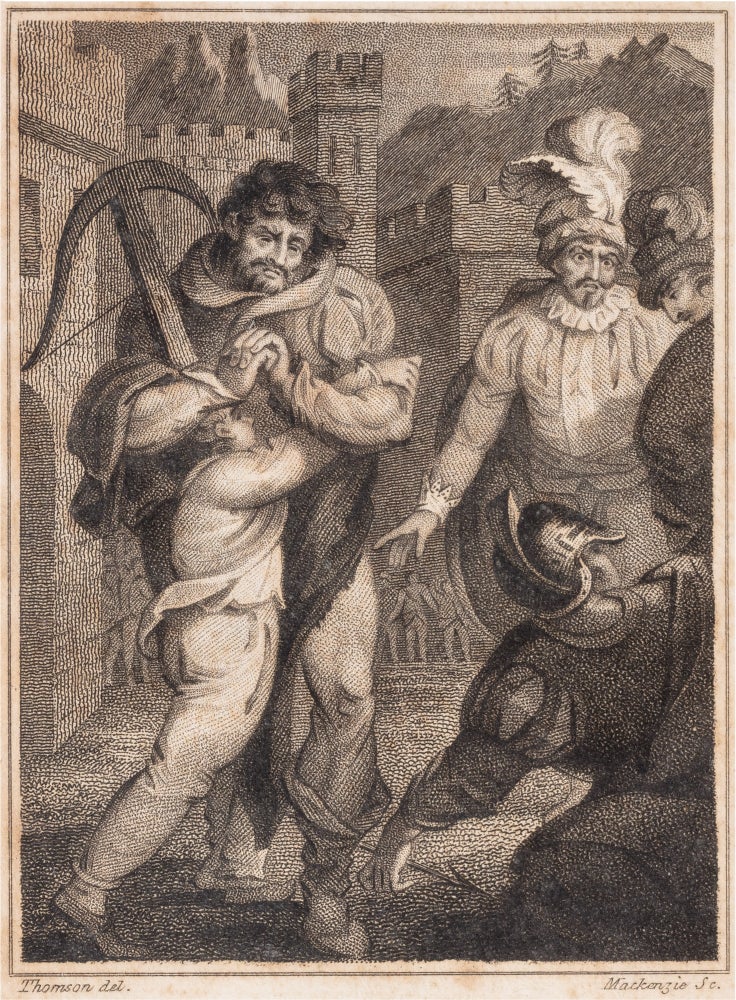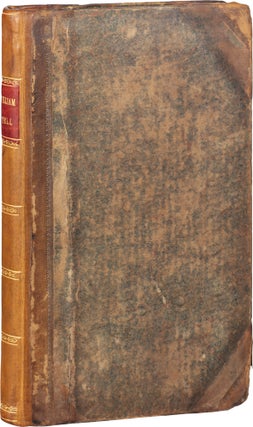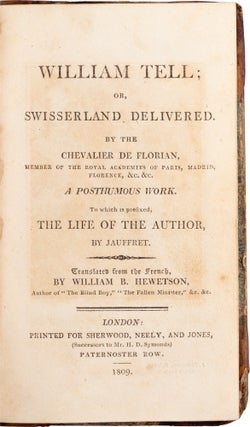William Tell; or Swisserland Delivered
London: Sherwood, Neely, Jones, 1809. First Edition. Hardcover. 1st edition in English. Contemporary 1/2 calf, boards, spine rebacked with new calf, boards worn, frontispiece foxed and lightly offset onto the title page but the rest is clean, it lacks the half–title otherwise it collates complete with the 5 pages of ads at the end, and it’s very good. Coll: 12mo. iii–xxxvi, 115pp, [5]. Ref: Gumuchian only notes Harris’ 1823 edition, not this one. COPAC lists just the The British Library copy. OCLC lists 3 copies total in libraries, and ABPC lists none at auction in 40 years, and it is scarce, but it can’t possibly be that scarce or I’ve priced it way too cheap. Very good. Item #459
In medieval lore (written records only trace to the 1480s), William Tell, from Bürglen in the state (or administrative division or canton) of Uri, was known as a sharpshooter with a crossbow. In 1307 (the same year France purged the Templars) the Habsburg emperors took possession of Uri, and Hermann Gessler was appointed Austrian Vogt of Altdorf. To assert his control, he put his hat on top of a pole in the village’s central square and ordered all who passed to bow before it. As Tell walked by he ignored the hat, was immediately arrested and sentenced to death unless (because of his repute) he could shoot an apple (the fruit not the smartphone) off the head of his son, Walter. If he failed, both would be executed. Tell placed 2 bolts in his quiver, set one of them in his crossbow, took aim and split the apple. Gessler hailed Tell then asked about the second bolt he carried. Tell answered that had he missed the apple and killed his son, he would have reloaded his crossbow and killed Gessler. This infuriated Gessler, though once pardoned Tell could not be executed, so Gessler had Tell brought to his ship so as to take Tell to his castle at Küssnacht, but in a Lake Lucerne storm, Tell managed to escape. Now it’s well known that in driving a rear engine sports car through a corner at high speed, the back end will come around, and when it does the driver has to avoid the breaks and accelerate to straighten it out. Like such a car, once on land, Tell hit the gas. Brave enough to follow a burning fuse in search of an explosive, he raced to Küssnacht, arrived before Gessler, then ambushed, shot and killed him. This defiance of the Austrian Habsburgs provoked rebellions that, in 1386, finally lead to Swiss independence and the founding of their Confederation.
Price:
$500.00



